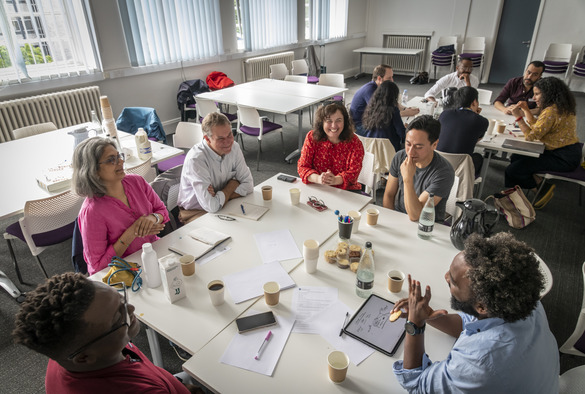Collaborative ILO and University of Liverpool Financial Sector and Social Outcomes Symposium explores vital strategies for financial inclusion

The University of Liverpool, in partnership with the United Nations International Labour Organization’s (ILO) Social Finance Programme, hosted a one-day symposium titled "Financial Sector and Social Outcomes" on Wednesday, June 19th 2024. The event brought together leading researchers, practitioners, and policymakers to explore the financial sector's critical role in promoting decent work and fostering positive social outcomes.
The event commenced with opening remarks by Professor Corina Constantinescu, Director of the Institute for Financial and Actuarial Mathematics at the University of Liverpool, and Craig Churchill, Chief of Social Finance Programme at ILO. They emphasized the importance of integrating financial strategies to support vulnerable populations, particularly women and small enterprises.
The first panel discussed focused on enhancing financial inclusion and education. Speakers included Yousra Hamed (ILO), Porhour Ly (Boost Capital), and Karen Bennett CBE (Enterprise Credit Union). Topics of discussion included enhancing financial education programs and leveraging digital financial inclusion services, highlighting the ILO's work with financial service providers and regulators to improve financial literacy and access to digital services.
Cedric Koffi, PhD student at the University of Liverpool, led an academic session on the impact of social factors on loan delinquency in microfinance. Koffi presented a predictive model for microfinance customer repayment behaviours, providing a benchmark for understanding future customer behaviour.
Professor Andrea Macrina (University College London) delivered a compelling talk on the limitations of the ESG framework. He introduced the Carbon Equivalence Principle (CEP) as a more effective measure for integrating greenhouse gases into financial markets, using South Africa’s power utility, Eskom, as a case study.
A panel on climate change adaptation and public-private partnerships discussed models for agricultural insurance and strategies to reduce the vulnerabilities of smallholder farmers. Aparna Dalal and Craig Churchill (ILO) shared insights from a joint project with the Agence Française de Développement, highlighting the financial sector's role in supporting a sustainable economy.
The panel on inclusive insurance explored strategies for improving access to insurance for vulnerable populations. Lisa Morgan (ILO), Maria Elena Anker (The Generation Foundation), and Michal Matul (AXA Emerging Consumers) shared successful initiatives from leading insurance providers aimed at overcoming inclusion barriers.
Lisa Morgan (ILO) presented case studies on designing insurance solutions tailored for women, addressing their specific risk profiles and enhancing their financial resilience.
Professors Severine Arnold (University of Lausanne) and Corina Constantinescu (University of Liverpool) discussed a meta-analysis of over 1,000 journal articles, highlighting significant behavioural changes inclusive insurance can bring to financial and health services.
The final panel of the day focused on digital financial services for wage workers. Andrej Slivnik (ILO), Ella Moffat (RISE), and Emily Trant (Wagestream) presented innovative strategies and policy recommendations for developing responsible digital financial services, emphasizing the importance of collaboration among researchers, practitioners, and development organizations.
Dr Munir Hiabu from the University of Copenhagen concluded the symposium with an academic presentation advocating for the recognition of mobile money wage payments as digital costs in Kenya. The study, a collaborative effort with Socrates Waka Onyando, Joel Yvan Njabo Tchapnda, and Dhorasso Nguefack from AIMS Rwanda, provided insights into the factors driving Kenyan enterprises to adopt mobile money for wage payments.
Professor Corina Constantinescu, Director of the Institute for Financial and Actuarial Mathematics at the University of Liverpool, said: “The symposium which we organised in partnership with the ILO highlighted the critical role of the financial sector in supporting financially vulnerable populations and promoting social outcomes through innovative financial inclusion strategies. The event provided a platform for sharing research-backed insights and practical experiences, fostering collaboration between academia, financial institutions, and development organizations.”
Craig Churchill, Chief of Social Finance Programme at the ILO, said: “The financial sector has the potential to achieve greater social results than it is currently delivering. This event was an excellent opportunity to explore synergies between development practitioners and academics – synergies which are needed to help the financial sector unlock its potential to contribute to the UN Sustainable Development Goals in general, and in particular to creating. ”